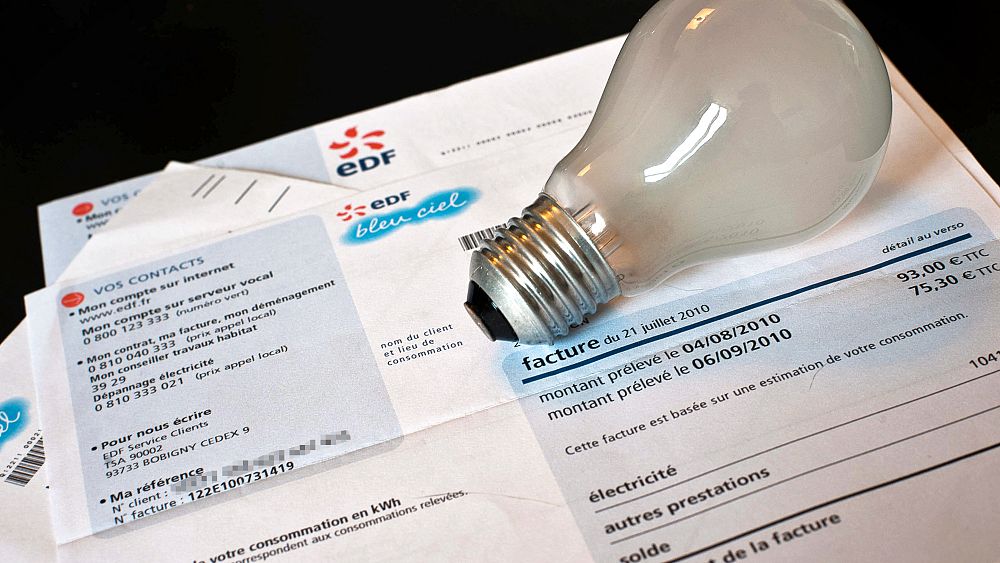
Natural gas prices are surging in Europe, increasing over sevenfold since last year in a crisis that is likely to cause increases in consumers’ energy bills.
It’s in part due to surging demand as COVID-19 pandemic restrictions ease in many countries. Consumers also used more natural gas for heating during a long winter in Europe last year.
Read more about the causes of the crisis here.
The rising prices are likely to be felt more acutely on consumers’ bills as temperatures drop in Europe but experts say there are many ways that EU citizens can try to reduce their energy bills.
Energy efficiency
One of the most obvious things that consumers can do is to use less energy and to know what uses the most energy.
“The cheapest energy is the energy that we don’t use,” said Eoin Kelly, an energy policy officer at The European Consumer Organisation. “Space and water heating together can cost about 50 per cent of a lot of users’ bills,” he explained.
Kelly runs the STEP Project, which offers advice and low-cost solutions for people at risk of not being able to pay their energy bills. He says that there are many simple ways that consumers can reduce the water they use and better insulate their homes to keep their energy bills lower.
This includes not blocking radiators with clothes or furniture so they can properly heat rooms and not charging phones or computers unnecessarily.
Kelly says that you can lose around 20 per cent of heat through the floor and about 25 per cent through the attic, so it’s good to make sure that they are properly insulated.
Using a showerhead with a low flow can also cut down water use significantly and lower the energy bill.
Comparing contracts between suppliers
Consumers should also look through their energy contracts and can compare potential suppliers, some experts suggest.
“We know from our monitoring that quite a number of consumers in Europe are still with their traditional supplier, that is the one that they had from before liberalisation,” said Dennis Hesseling, the head of the infrastructure, gas & retail department at the European Union Agency for the Cooperation of Energy Regulators (ACER).
“Quite often, not always, but quite often there are cheaper offers available in the market.”
You could have a fixed price contract that is higher priced but does not fluctuate or a variable contract that depends more on the market, for instance.
“It’s really, really important to look at the different energy contract options that are offered to you,” says Marine Cornelis, the founder of Consumer Next Energy and EU climate pact ambassador.
“There are in Europe, some price comparison tools where you can really compare with the certified system, the different prices offered by different providers. And this is a way to at least control and know what you will spend.”
Hesseling adds that by consulting these comparison websites, which are often certified through ombudsmen or regulators, people can compare different offers.
“Normally you input your energy consumption, you get an overview of the offers which are available to you as a consumer, and you can compare them and see which one is cheaper. And in some cases, you may find another supplier which can offer you the same electricity and gas for a cheaper price,” he said.
While a fixed price contract may be higher priced, however, experts encourage people to stay with these contracts during the price crisis, as a variable contract could be influenced by the high prices.
It’s also important to verify whether you qualify for any benefits depending on the specific contract. In Spain, for instance, the “Bono social” or government energy discount applies for contracts in the regulated market, where few fixed-price contracts are offered.
It’s complicated… so speak to suppliers and others for help
Consumers can also speak with suppliers about a possible payment plan as bills go up this winter, experts say, or reach out for help through consumer organisations and non-profits focused on energy poverty.
“The problem is a lot of the time it can be difficult for consumers to shop around. They might not have the time or resources. We can’t all be professional consumer rights advocates. It shouldn’t be a full-time job to know your consumer rights,” says Kelly, who works to better inform people of how to tackle energy poverty.
Many charities also work towards empowering people and educating them on how to access subsidies that are available through local outreach and citizens’ assemblies.
“People who are already struggling tend to feel that the system is not designed for them or that they are not entitled to [aid] because there might be other people who suffer more,” Cornelis said.
It can be difficult to get through the bureaucratic loopholes to access aid that’s available.
Spain’s government discount is only accessed by around one in three families that qualify for it.
“We have a very miserly, very stingy, very difficult, very bureaucratic social bonus, where we have very demanding conditions…and therefore the discount in the social bonus is very small,” said Enrique García from the Organisation of Consumers and Users (OCU), an independent Spanish consumer organisation.
Many experts and charities are also calling on governments to issue bans on disconnections that prevent people who are unable to pay their bills from losing power or heating, which many did during the pandemic.
“It should be made easier for [consumers]. Their billing should be clearer and they should be given better tools to shop around and find a different supplier,” Kelly added.